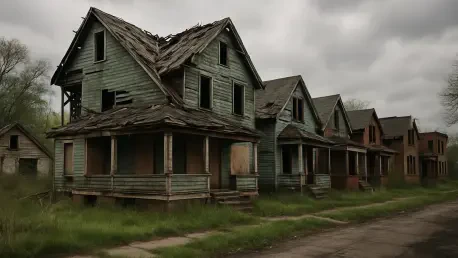Detroit, a city long associated with industrial grit and resilience, finds itself at the heart of a housing crisis that could reshape its future, as major landlords who control vast swaths of the city’s residential rental properties are staring down the barrel of financial ruin. Foreclosures and abandoned buildings are becoming all-too-common sights, raising critical questions about the stability of housing for thousands of tenants and the viability of real estate investment in the region. What forces are pushing even the most established property owners to the brink? The answer lies in a complex web of economic pressures, legal hurdles, and market dynamics that have created a perfect storm for Detroit’s rental sector. As these challenges mount, the ripple effects threaten not only the livelihoods of landlords but also the well-being of entire communities dependent on stable housing. This article delves into the root causes of this crisis, exploring how rising costs, declining revenues, policy shifts, and systemic instability are converging to undermine one of the city’s most vital industries.
Economic Struggles Undermining Profitability
The financial burdens weighing on Detroit’s landlords are staggering, creating an environment where profitability feels like a distant dream. Property owners are grappling with a dramatic surge in operational expenses that cut deep into their margins. Insurance premiums for properties have doubled in recent years, reflecting heightened risks and market volatility in the area. Meanwhile, interest rates on loans and refinancing have climbed, making debt management a constant struggle. Maintenance and construction costs, already high due to aging infrastructure, show no signs of easing. Perhaps most punishing are Detroit’s property taxes, among the highest in the nation, which act as a relentless drain on resources. For many landlords, this combination of escalating costs forms an insurmountable barrier, leaving little room for financial maneuvering. Without substantial relief—whether through subsidies or policy changes—sustaining a rental business in this climate becomes a near-impossible task, pushing even seasoned investors toward collapse.
Beyond the rising expenses, the revenue side of the equation offers little relief for Detroit’s beleaguered landlords. Rent collection, a lifeline for any property owner, has seen a sharp decline since the economic disruptions of the pandemic. Many tenants, facing their own financial hardships, are either unable or unwilling to pay on time, if at all. Vacancy rates have crept upward, further eroding the cash flow needed to cover mortgages, taxes, and upkeep. Industry experts note that most multifamily properties require at least a 90% occupancy rate with consistent payments to break even, yet this threshold remains elusive for a growing number of Detroit landlords. The resulting “bad debt” from uncollected rents compounds the problem, turning once-profitable buildings into financial liabilities. This persistent shortfall in income, paired with unyielding costs, paints a grim picture for property owners who find themselves squeezed from both ends of the balance sheet.
Legal and Policy Challenges Adding to the Strain
Navigating the legal landscape in Detroit has become a significant obstacle for landlords seeking to stabilize their operations. Recent changes to Michigan’s eviction laws, alongside tenant-friendly policies enacted by the city, have dramatically slowed the process of removing non-paying tenants. What used to take roughly two months to complete an eviction now often extends to four or five months, leaving landlords without rental income for prolonged periods. Reforms such as preliminary hearings aimed at reducing default judgments and ordinances guaranteeing legal representation for tenants have been hailed as victories for equity by advocates. However, many property owners argue that these measures are frequently exploited, with some tenants treating rent as optional or citing minor maintenance issues as justification for nonpayment. This extended timeline not only strains finances but also discourages landlords from taking on new tenants, fearing further losses in an already precarious market.
City officials, while sympathetic to some landlord concerns, maintain that their ability to address broader market challenges is limited. Initiatives like the Payment in Lieu of Taxes program offer tax reductions to property owners who commit to maintaining affordable units, providing a small buffer against financial distress. Yet, as representatives from the Housing and Revitalization Department point out, factors such as rising interest rates and soaring insurance costs fall outside municipal jurisdiction. Tenant advocates and legal aid representatives, on the other hand, defend these policy shifts as essential corrections to a system that has long favored landlords over vulnerable residents. They argue that protections like the right to counsel ensure fairer outcomes in eviction cases, preventing unjust displacements. This clash of perspectives highlights a deeper tension between the need for landlord viability and the push for tenant rights, leaving property owners caught in a regulatory bind with no easy resolution in sight.
Market Instability Threatening Long-Term Viability
The specter of foreclosure hangs heavy over Detroit’s rental market, signaling deep instability that extends beyond individual landlords to the broader housing ecosystem. High-profile cases of property owners losing entire portfolios have sent shockwaves through the industry, serving as cautionary tales of what lies ahead for others. These foreclosures do more than devastate individual businesses; they dry up capital and deter new investment, creating a chilling effect on the market. Michigan’s tax structure adds another layer of complexity, as property taxes often spike dramatically upon ownership changes, discouraging potential buyers from stepping in to rescue struggling buildings. The result is a growing number of abandoned properties, particularly in areas like Palmer Park, which further diminish the city’s housing stock. This cycle of loss and disinvestment poses a severe risk to both tenants, who face displacement, and the economic vitality of neighborhoods already struggling to recover.
Compounding the issue is a critical slowdown in new housing construction, which fails to keep pace with Detroit’s needs. Recent data from the City Planning Commission indicates that only a fraction of the required multifamily units are being built, with unsubsidized projects particularly scarce. This shortage exacerbates the strain on existing rental properties, limiting options for tenants and reducing opportunities for landlords to shift focus to more lucrative developments. Without a significant increase in construction—or substantial government subsidies to incentivize it—the housing scarcity in Detroit risks spiraling into a full-blown crisis. Developers point out that the high costs and regulatory hurdles make many projects unfeasible without external support, leaving the market trapped in a vicious cycle. As supply dwindles and demand persists, the pressure on both property owners and renters intensifies, threatening to deepen the instability already gripping the city’s rental sector.
Pathways Forward Amidst Housing Turmoil
Reflecting on the challenges that have unfolded, it’s evident that Detroit’s rental market stands at a precarious crossroads, with landlords bearing the brunt of economic and legal headwinds. The crushing weight of rising costs, dwindling revenues, prolonged eviction processes, and systemic market failures has driven many property owners to the edge of financial ruin. High-profile foreclosures and abandoned buildings have become stark symbols of a sector in distress, while tenant protections, though vital for equity, add to the operational burdens faced by landlords. The city’s efforts to support affordable housing through tax incentives have offered some relief, yet they fall short of addressing the broader forces at play.
Looking ahead, actionable solutions must bridge the gap between landlord sustainability and tenant well-being to avert further collapse. Targeted interventions, such as state-level subsidies for property maintenance or streamlined legal processes with mandatory escrow payments during disputes, could ease financial pressures on landlords without undermining renter protections. Additionally, incentivizing new construction through public-private partnerships might address the housing shortage, stabilizing the market over time. Collaboration among stakeholders—landlords, tenant advocates, and policymakers—remains essential to craft policies that balance profitability with fairness. Detroit’s path forward hinges on innovative strategies that preserve housing stock and foster investment, ensuring that the city’s rental sector emerges stronger from this turbulent chapter.









